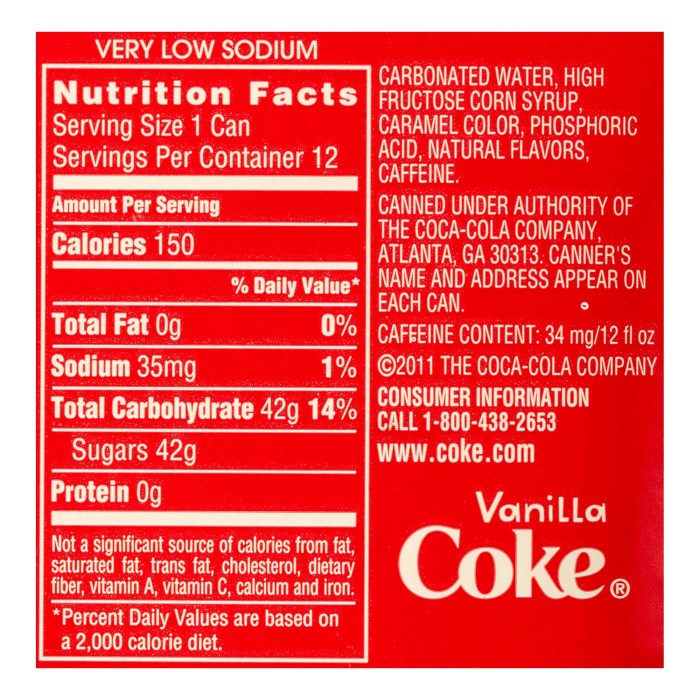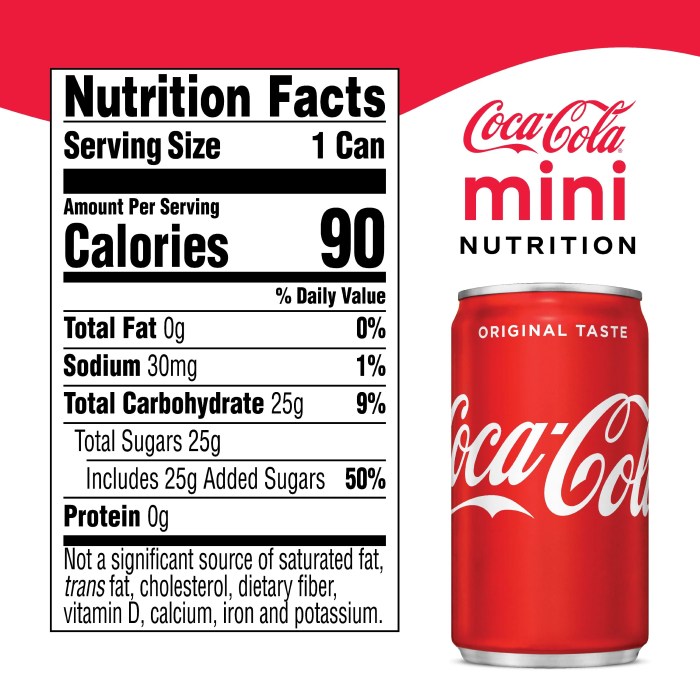Coca-Cola’s Nutritional Content: Coca Cola Nutrition Facts Caffeine
Coca cola nutrition facts caffeine – Coca-Cola, a globally recognized carbonated soft drink, has a distinct nutritional profile characterized by its high sugar content and lack of essential nutrients. Understanding this profile is crucial for assessing its potential impact on health and making informed dietary choices. This section details the nutritional composition of a standard serving, compares it to other soft drinks, and explores the associated health implications.
Nutritional Components of Coca-Cola
A standard 12-ounce (355 ml) serving of Coca-Cola contains the following:
| Component | Amount per Serving | % Daily Value | Unit of Measurement |
|---|---|---|---|
| Calories | 140 | 7 | kcal |
| Total Carbohydrate | 39 | 13 | g |
| Sugars | 39 | – | g |
| Sodium | 0 | 0 | mg |
| Protein | 0 | 0 | g |
| Fat | 0 | 0 | g |
*Note: Daily Values are based on a 2,000 calorie diet. The % Daily Value may vary depending on individual caloric needs.* These values are approximate and may slightly vary depending on the source and manufacturing processes.
Comparison to Other Carbonated Soft Drinks
The nutritional profile of Coca-Cola is relatively similar to other carbonated soft drinks, particularly those that are cola-flavored or contain high fructose corn syrup. However, specific values can differ based on the brand, recipe, and serving size.
- Many other colas have comparable sugar and calorie content, often falling within a range of 130-150 calories and 35-40 grams of sugar per 12-ounce serving.
- Diet or zero-sugar versions of Coca-Cola and other sodas typically contain significantly fewer calories and carbohydrates, often relying on artificial sweeteners.
- Some fruit-flavored carbonated drinks might have slightly lower sugar content but still contain substantial amounts of added sugars.
- The specific nutritional information for each beverage should be consulted on its respective label for accurate comparisons.
Health Implications of Regular Coca-Cola Consumption
Regular consumption of Coca-Cola and other sugar-sweetened beverages is associated with several negative health consequences. The high sugar content contributes to weight gain, increased risk of type 2 diabetes, heart disease, and dental problems.
- The high fructose corn syrup commonly used in Coca-Cola is linked to increased fat storage in the liver and potential metabolic dysfunction.
- Excessive sugar intake can lead to insulin resistance, a key factor in the development of type 2 diabetes.
- The high sugar content can also contribute to tooth decay due to the corrosive effect of sugars on tooth enamel.
- Studies have shown a correlation between regular consumption of sugar-sweetened beverages and an increased risk of cardiovascular diseases.
Alternative Beverage Options

Choosing healthier alternatives to Coca-Cola offers significant benefits for overall health and well-being. Replacing sugary sodas with beverages lower in sugar, calories, and caffeine can contribute to improved weight management, reduced risk of chronic diseases, and enhanced energy levels. This section explores several healthier options, comparing their nutritional profiles and taste profiles to Coca-Cola.
Nutritional Comparison of Beverages
The following table provides a comparison of Coca-Cola with several healthier alternatives. Note that caffeine and sugar content can vary depending on brand and serving size. These values represent averages for commonly available options.
Understanding Coca-Cola’s caffeine content is crucial for mindful consumption. A comparison with the caloric density found in other popular fast food items, such as the information available on big mac nutrition facts , highlights the broader context of sugar and calorie intake. Returning to Coca-Cola, the caffeine level should always be considered alongside its overall nutritional profile.
| Beverage Type | Caffeine Content (mg) | Calories | Sugar Content (grams) |
|---|---|---|---|
| Coca-Cola (12 oz) | 34 | 140 | 39 |
| Unsweetened Iced Tea (12 oz) | 0-30 (depending on type and brewing) | 0-20 (depending on added sweeteners) | 0-5 (depending on added sweeteners) |
| Water (12 oz) | 0 | 0 | 0 |
| Sparkling Water (12 oz) | 0 | 0 | 0 |
| Unsweetened Almond Milk (1 cup) | 0 | 30-40 | 0-1 |
| 100% Fruit Juice (4 oz) | 0 | 60-80 | 15-20 |
Taste Profile Comparisons and Underlying Reasons
Coca-Cola’s distinctive taste is primarily due to its complex blend of carbonation, high fructose corn syrup (or sugar), caramel color, phosphoric acid, and natural and artificial flavorings. This combination creates a sweet, slightly acidic, and intensely carbonated profile. Healthier alternatives, such as unsweetened iced tea or sparkling water, lack these specific components. Unsweetened tea offers a more subtle, slightly bitter taste that depends on the tea type, while sparkling water provides a crisp, refreshing sensation primarily from the carbonation.
Unsweetened almond milk possesses a creamy, slightly nutty flavor. 100% fruit juice provides a naturally sweet taste that is significantly less intense than Coca-Cola, varying depending on the type of fruit. The differences in taste stem from the absence of artificial sweeteners, coloring, and the unique flavor profiles of the natural ingredients used.
Impact of Switching Beverages on Health and Well-being
Switching from Coca-Cola to healthier alternatives can significantly improve overall health and well-being. Reducing sugar intake helps in weight management and reduces the risk of type 2 diabetes, heart disease, and other metabolic disorders. Decreasing caffeine consumption can mitigate anxiety, insomnia, and digestive issues for sensitive individuals. Replacing sugary drinks with water or unsweetened beverages increases hydration, which is crucial for various bodily functions.
For example, studies have shown that individuals who regularly consume sugary drinks have a higher body mass index (BMI) and increased risk of developing chronic diseases compared to those who consume water or unsweetened beverages. Replacing Coca-Cola with water alone can lead to noticeable weight loss and improved energy levels over time. Similarly, substituting it with unsweetened tea or other low-calorie options can contribute to a more balanced diet and healthier lifestyle.
Consumer Perception and Marketing

Coca-Cola’s marketing strategies profoundly shape consumer perceptions of its products, particularly regarding nutritional content and caffeine levels. Decades of advertising have created a powerful brand identity, inextricably linking the beverage with refreshment, happiness, and social connection. However, this positive association has also led to a complex relationship between consumers and the product’s inherent characteristics, namely its sugar and caffeine content.
Understanding this dynamic is crucial to analyzing Coca-Cola’s marketing successes and challenges in the evolving landscape of health-conscious consumerism.Coca-Cola’s marketing consistently emphasizes the pleasurable sensory experience of consuming the beverage. Advertisements often portray scenes of shared enjoyment, emphasizing the social aspects of drinking Coca-Cola rather than directly addressing its nutritional profile. While some campaigns acknowledge the existence of different product options (e.g., Diet Coke, Coke Zero), the core messaging typically focuses on the iconic taste and the emotional connection it evokes.
This strategy subtly downplays the less desirable aspects of the product’s nutritional content, leveraging positive emotions to outweigh any potential concerns.
Coca-Cola’s Key Marketing Messages Regarding Health and Well-being
Coca-Cola’s advertising campaigns rarely explicitly promote health and well-being in relation to the original Coca-Cola formula. Instead, the emphasis lies on creating positive emotional associations. Messages frequently center on themes of happiness, refreshment, and shared experiences. For example, campaigns often depict families enjoying Coca-Cola together, suggesting a sense of togetherness and bonding. This indirect approach subtly shapes consumer perception, associating the product with positive feelings rather than focusing on its nutritional value.
The company’s focus has shifted toward promoting its wider beverage portfolio, including lower-calorie and healthier options, to cater to the growing health-conscious market segment.
Hypothetical Marketing Campaign for a Healthier Coca-Cola, Coca cola nutrition facts caffeine
A hypothetical marketing campaign for a healthier version of Coca-Cola, let’s call it “Coca-Cola Vive,” would need to strike a delicate balance between retaining brand recognition and promoting a healthier image. The target audience would be health-conscious individuals, particularly millennials and Gen Z, who are increasingly seeking healthier beverage options without sacrificing taste.The key messages would focus on transparency and natural ingredients.
The campaign could highlight the reduced sugar content, the use of natural sweeteners, and the addition of beneficial ingredients like antioxidants or vitamins. The visual aesthetic would need to reflect this healthier positioning, using vibrant colors representing natural ingredients and active lifestyles. Instead of focusing solely on the emotional connection, the campaign would emphasize the product’s role in supporting a balanced lifestyle, promoting active living and mindful consumption.
The slogan could be something like “Coca-Cola Vive: Refresh Your Body, Refresh Your Life,” emphasizing both the refreshing qualities and the health benefits. This approach would appeal to a younger demographic concerned about both taste and well-being, allowing Coca-Cola to tap into a growing market segment while maintaining brand loyalty.
FAQ Overview
Does Coca-Cola contain any artificial sweeteners?
No, standard Coca-Cola does not contain artificial sweeteners. Its sweetness comes primarily from sugar.
How does caffeine in Coca-Cola compare to energy drinks?
Energy drinks generally contain significantly higher levels of caffeine than Coca-Cola.
Are there diet versions of Coca-Cola with reduced sugar?
Yes, Coca-Cola Zero Sugar and Diet Coke are examples of lower-sugar or sugar-free alternatives.
What are the long-term effects of consuming high amounts of caffeine?
High caffeine intake can lead to anxiety, insomnia, and digestive issues. Long-term effects can vary depending on individual tolerance and overall health.
